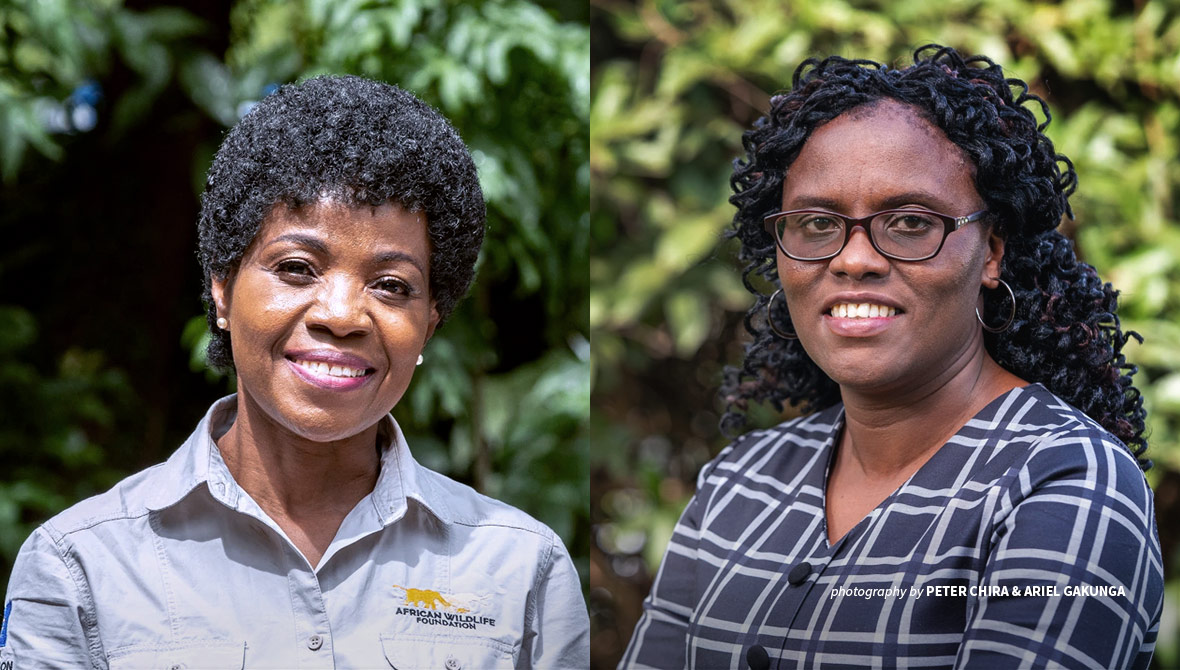IWD 2023: Celebrating women-led conservation in Zimbabwe and Kenya

Oliva Mufute, Country Director, Zimbabwe and Nancy Githaiga, Country Director, Kenya
In honor of International Women’s Day on March 8, 2023 and throughout the month, African Wildlife Foundation is spotlighting the achievements of our women leaders overseeing AWF’s country programs in Rwanda, Zimbabwe, and Kenya and celebrating the commitment of women in conservation across the continent.
Today, our Country Directors in Zimbabwe and Kenya reflect on the conservation successes of the past year and share their priorities for 2023.
Oliva Mufute, Country Director, Zimbabwe
Since 2021, AWF has supported the inaugural Zimbabwe Biodiversity Economy Report. This landmark study lays the foundation for developing a Natural Capital Accounting Framework, environmental policy reviews, and creating growth opportunities in the wildlife sector. In July 2022, the Minister of Environment, Climate, Tourism and Hospitality Industry Hon. Nqobizitha Mangaliso Ndlovu signed the strategic document, paving the way for the official launch. This high-level support and endorsement of the report by the Government of Zimbabwe is a huge milestone for the country, and AWF looks forward to increased interest in the biodiversity economy and improved national economic development.
On June 21, 2022, AWF hosted a gala celebrating AWF’s 60th anniversary at the Benjamin Mkapa African Wildlife Photography Awards Exhibition at the National Gallery of Zimbabwe. The event was graced by the Environment, Climate, Tourism and Hospitality Industry Permanent Secretary Munesushe Munodawafa, representatives from the wildlife and tourism industry, local communities, environmental management organizations, business, and private sector representatives, as well as members of the diplomatic community, donors, and development partners. AWF showcased photographs of Africa’s diverse ecosystems to engage Zimbabwean creatives to become advocates for conservation and sustainable development.
In June 2022, our field teams completed the highly impactful European Union-funded ‘Partnership for improved anti-poaching and compatible land use in community lands of the Lower Zambezi–Mana Pools Transboundary Conservation Area’ project. A final evaluation by external consultants and auditors reflected an effective program since 2018. To showcase the project’s successes and intensifying donor engagement, AWF Zimbabwe hosted eight European Union Heads of Cooperation and Deputy Ambassadors in Mbire District from November 21-23, 2022.
Last year, we finalized the Mid-Zambezi Valley Conservation strategy, a document that provides insight into the planning of conservation, development, and agriculture within the landscape in light of climate change impacts and the growing human population. Our efforts in the Mid-Zambezi Valley landscape helped improve infrastructure and supported cross-border anti-poaching collaborations as well as the first-ever joint hippo survey.
In 2023, our hopes are pinned on the successful launch of the Zimbabwe Biodiversity Economy report and various developments in our conservation efforts, including the installation of a digital radio communication system in the Mid-Zambezi Valley and the establishment of the Marongora research center. Additionally, AWF will continue to support women wildlife scouts in Mbire and invest in species research, focusing on lions. These efforts to reduce poaching and trafficking are critical for biodiversity and local development, helping maintain and restore wildlife habitats while building rural community resilience.
Nancy Githaiga, Country Director, Kenya
Last year, we deepened our engagement with various relevant ministries in Kenya, most notably the Ministry of Environment, Climate Change, and Forestry. Apart from overseeing natural resource management in the country, the ministry is the custodian of key multilateral environmental agreements such as the United Nations Convention on Biological Diversity (UNCBD) and the United Nations Framework Convention on Climate Change (UNFCCC). As such, AWF joined government delegations to the Conference of Parties for CBD, UNFCCC, and the Convention on International Trade in Endangered Species of Wild Fauna and Flora (CITES) to ensure that actions are domesticated as agreed in the conventions.
AWF continues to respond to urgent threats facing wildlife populations and communities across the country’s biodiversity-rich landscapes. Working closely with the Kenya Wildlife Service, we supported the finalization of the Elephant Action Plan and the White Rhino Action Plan, the first-ever such plan for the species in Kenya. While Kenya did not report any rhino poaching in 2022, it is contending a persistent drought that has killed more wildlife than poaching has done in the same period. Meanwhile, the prolonged drought has pushed the country into an acute hunger crisis. This stark reality signals the urgency for climate adaptation and action to create a future in Africa where people and wildlife thrive.
In 2023, AWF is particularly interested in mobilizing resources through local partnerships to strengthen our climate change mitigation measures. In the Tsavo landscape, with support from the TUI Care Foundation, we will improve water infrastructure to benefit wildlife, livestock, and people while strengthening farming systems to increase food security and the general well-being of the local community. The program will also equip local communities to diversify tourism products and revenues as we continue to build a constituency of conservationists by providing conservation education through the Classroom Africa program.
> Learn how Belise Kariza, Country Director, Rwanda is spearheading innovative conservation models